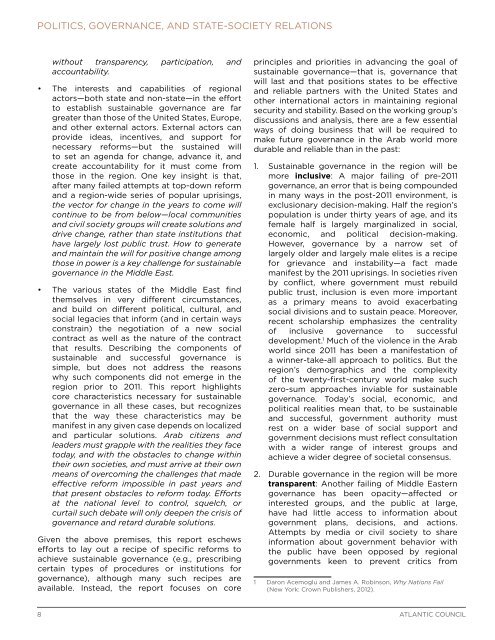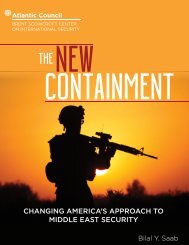POLITICS GOVERNANCE STATE-SOCIETY RELATIONS
Politics_Governance_and_State-Society_Relations_web_1121
Politics_Governance_and_State-Society_Relations_web_1121
Create successful ePaper yourself
Turn your PDF publications into a flip-book with our unique Google optimized e-Paper software.
<strong>POLITICS</strong>, <strong>GOVERNANCE</strong>, AND <strong>STATE</strong>-<strong>SOCIETY</strong> <strong>RELATIONS</strong><br />
without transparency, participation, and<br />
accountability.<br />
• The interests and capabilities of regional<br />
actors—both state and non-state—in the effort<br />
to establish sustainable governance are far<br />
greater than those of the United States, Europe,<br />
and other external actors. External actors can<br />
provide ideas, incentives, and support for<br />
necessary reforms—but the sustained will<br />
to set an agenda for change, advance it, and<br />
create accountability for it must come from<br />
those in the region. One key insight is that,<br />
after many failed attempts at top-down reform<br />
and a region-wide series of popular uprisings,<br />
the vector for change in the years to come will<br />
continue to be from below—local communities<br />
and civil society groups will create solutions and<br />
drive change, rather than state institutions that<br />
have largely lost public trust. How to generate<br />
and maintain the will for positive change among<br />
those in power is a key challenge for sustainable<br />
governance in the Middle East.<br />
• The various states of the Middle East find<br />
themselves in very different circumstances,<br />
and build on different political, cultural, and<br />
social legacies that inform (and in certain ways<br />
constrain) the negotiation of a new social<br />
contract as well as the nature of the contract<br />
that results. Describing the components of<br />
sustainable and successful governance is<br />
simple, but does not address the reasons<br />
why such components did not emerge in the<br />
region prior to 2011. This report highlights<br />
core characteristics necessary for sustainable<br />
governance in all these cases, but recognizes<br />
that the way these characteristics may be<br />
manifest in any given case depends on localized<br />
and particular solutions. Arab citizens and<br />
leaders must grapple with the realities they face<br />
today, and with the obstacles to change within<br />
their own societies, and must arrive at their own<br />
means of overcoming the challenges that made<br />
effective reform impossible in past years and<br />
that present obstacles to reform today. Efforts<br />
at the national level to control, squelch, or<br />
curtail such debate will only deepen the crisis of<br />
governance and retard durable solutions.<br />
Given the above premises, this report eschews<br />
efforts to lay out a recipe of specific reforms to<br />
achieve sustainable governance (e.g., prescribing<br />
certain types of procedures or institutions for<br />
governance), although many such recipes are<br />
available. Instead, the report focuses on core<br />
principles and priorities in advancing the goal of<br />
sustainable governance—that is, governance that<br />
will last and that positions states to be effective<br />
and reliable partners with the United States and<br />
other international actors in maintaining regional<br />
security and stability. Based on the working group’s<br />
discussions and analysis, there are a few essential<br />
ways of doing business that will be required to<br />
make future governance in the Arab world more<br />
durable and reliable than in the past:<br />
1. Sustainable governance in the region will be<br />
more inclusive: A major failing of pre-2011<br />
governance, an error that is being compounded<br />
in many ways in the post-2011 environment, is<br />
exclusionary decision-making. Half the region’s<br />
population is under thirty years of age, and its<br />
female half is largely marginalized in social,<br />
economic, and political decision-making.<br />
However, governance by a narrow set of<br />
largely older and largely male elites is a recipe<br />
for grievance and instability—a fact made<br />
manifest by the 2011 uprisings. In societies riven<br />
by conflict, where government must rebuild<br />
public trust, inclusion is even more important<br />
as a primary means to avoid exacerbating<br />
social divisions and to sustain peace. Moreover,<br />
recent scholarship emphasizes the centrality<br />
of inclusive governance to successful<br />
development. 1 Much of the violence in the Arab<br />
world since 2011 has been a manifestation of<br />
a winner-take-all approach to politics. But the<br />
region’s demographics and the complexity<br />
of the twenty-first-century world make such<br />
zero-sum approaches inviable for sustainable<br />
governance. Today’s social, economic, and<br />
political realities mean that, to be sustainable<br />
and successful, government authority must<br />
rest on a wider base of social support and<br />
government decisions must reflect consultation<br />
with a wider range of interest groups and<br />
achieve a wider degree of societal consensus.<br />
2. Durable governance in the region will be more<br />
transparent: Another failing of Middle Eastern<br />
governance has been opacity—affected or<br />
interested groups, and the public at large,<br />
have had little access to information about<br />
government plans, decisions, and actions.<br />
Attempts by media or civil society to share<br />
information about government behavior with<br />
the public have been opposed by regional<br />
governments keen to prevent critics from<br />
1 Daron Acemoglu and James A. Robinson, Why Nations Fail<br />
(New York: Crown Publishers, 2012).<br />
8 ATLANTIC COUNCIL



